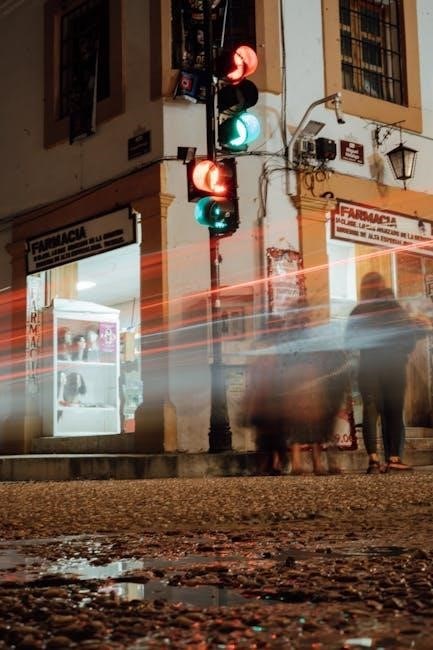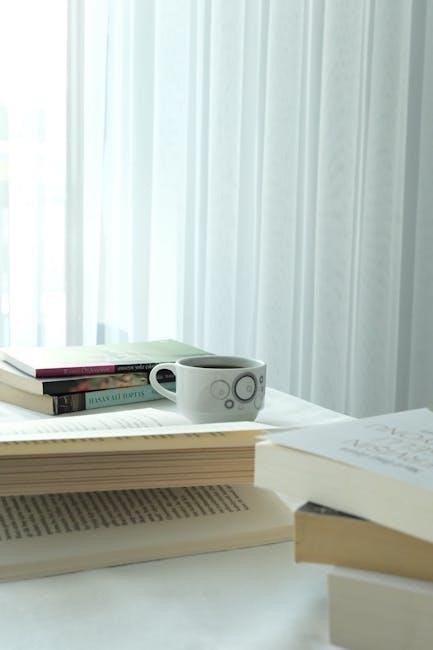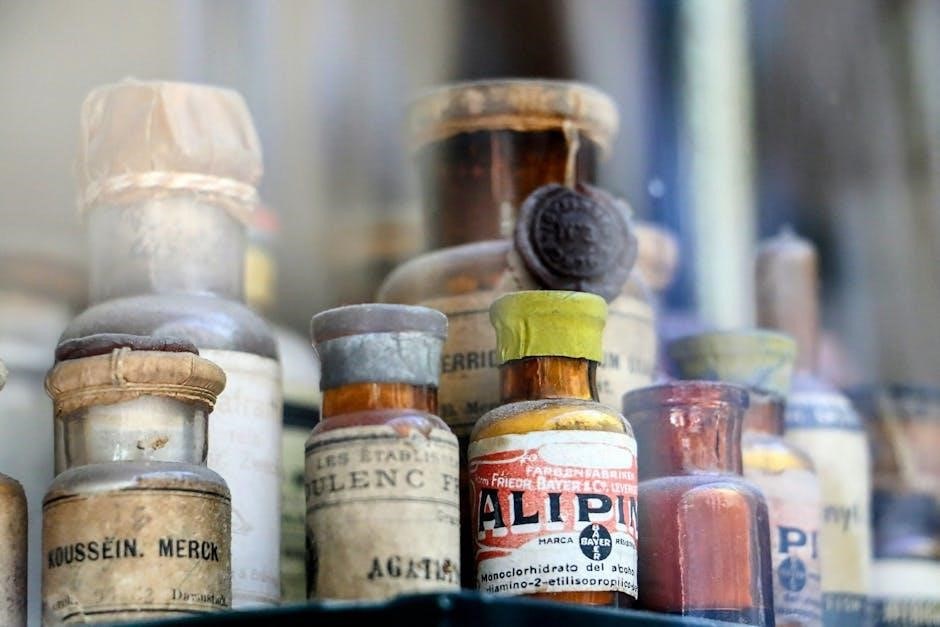Pharmacy technician textbooks are essential resources for understanding core competencies‚ covering topics like medication orders‚ calculations‚ and professional ethics. They are available in PDF formats for convenient access.

1.1 Overview of Pharmacy Technician Textbooks
Pharmacy technician textbooks are comprehensive guides designed to equip students and professionals with essential knowledge. They cover foundational topics such as medication orders‚ pharmacy calculations‚ and professional ethics. These textbooks are available in PDF formats‚ offering convenient access for learning. They are tailored for students in formal training programs‚ practicing technicians‚ and those preparing for certification exams. Key areas include understanding drug administration‚ legal requirements‚ and patient communication. These resources often include practice questions‚ case studies‚ and real-world scenarios to enhance understanding. By providing detailed insights into pharmacy operations‚ these textbooks serve as invaluable tools for building both theoretical and practical skills in the field.
1.2 Importance of Textbooks in Pharmacy Technician Education
Textbooks are vital for pharmacy technician education‚ providing structured learning and in-depth knowledge. They cover essential topics like medication administration‚ calculations‚ and ethics‚ ensuring a strong foundation. These resources include practice questions and real-world scenarios‚ preparing students for certification exams and practical challenges. Textbooks also serve as references for professionals‚ aiding in continuous learning. Their organized content helps students grasp complex concepts efficiently‚ making them indispensable for both classroom and self-study environments. By offering comprehensive guidance‚ textbooks play a crucial role in shaping competent pharmacy technicians capable of delivering quality patient care and excelling in their roles.
Key Topics Covered in Pharmacy Technician Textbooks
Textbooks cover medication orders‚ pharmacy calculations‚ law‚ patient communication‚ and environmental challenges‚ providing a comprehensive foundation for pharmacy technician education and practice.
2.1 Medication Orders and Administration
Medication orders and administration are critical topics in pharmacy technician textbooks‚ covering both retail and institutional settings; These sections detail the key information required on medication orders‚ such as patient details‚ prescriber information‚ drug specifics‚ dosage instructions‚ and refill policies. Understanding these elements ensures accurate and safe dispensing of medications. Textbooks also emphasize proper administration techniques‚ including routes of administration and patient monitoring. This knowledge is essential for pharmacy technicians to assist pharmacists effectively and maintain patient safety. The content is tailored to prepare technicians for real-world scenarios‚ ensuring they can process orders efficiently and adhere to legal and ethical standards in healthcare settings.
2.2 Pharmacy Calculations and Math
Pharmacy calculations and math are fundamental skills for pharmacy technicians‚ ensuring accurate preparation and dispensing of medications. Textbooks provide comprehensive guides on dosage calculations‚ concentration adjustments‚ and conversion between units. They cover essential topics like ratio and proportion‚ percentage preparations‚ and complex formulas. Practical examples and practice problems help technicians master these calculations‚ which are critical in both retail and institutional settings. Resources like “Pharmacy Calculations‚ 5th Edition” offer detailed tools for learning these skills‚ ensuring technicians can perform calculations confidently and accurately. These sections are designed to build proficiency‚ reducing errors and enhancing patient safety in daily pharmacy operations.
2.3 Pharmacy Law and Ethics
Pharmacy law and ethics are crucial for technicians to understand their legal and moral responsibilities. Textbooks cover federal and state regulations‚ patient confidentiality‚ and controlled substance handling. They emphasize ethical practices‚ such as avoiding medication errors and ensuring patient safety. Topics include HIPAA compliance‚ informed consent‚ and professional conduct. These resources also address legal implications of errors and the importance of adhering to ethical standards. By studying these sections‚ technicians gain the knowledge to navigate complex legal scenarios and maintain high ethical standards in their practice‚ ensuring trust and integrity in patient care. These principles are essential for building a strong foundation in pharmacy practice.
2.4 Patient Communication and Counseling
Pharmacy technician textbooks emphasize the importance of effective patient communication and counseling. They provide strategies for clear and empathetic interactions‚ ensuring patients understand their medications. Topics include active listening‚ cultural sensitivity‚ and addressing health literacy. These resources also cover how to explain dosage instructions‚ potential side effects‚ and proper storage of medications. Techniques for handling difficult conversations and ensuring patient adherence to treatment plans are also addressed. By mastering these skills‚ technicians can improve patient outcomes and build trust. Practical examples and case studies are often included to reinforce learning‚ making these sections invaluable for developing strong patient communication skills in real-world settings.

Popular Pharmacy Technician Textbooks
Popular textbooks include “Complete Review for the Pharmacy Technician‚” “Pharmacy Calculations‚ 5th Edition‚” and “Manual for Pharmacy Technicians‚ 5th Edition‚” covering essential topics for technician training and certification.
3;1 “Complete Review for the Pharmacy Technician”
“Complete Review for the Pharmacy Technician” is a comprehensive guide designed for students‚ professionals‚ and exam candidates. It covers essential topics like medication orders‚ calculations‚ and patient communication‚ making it ideal for both training and certification preparation. The textbook is available in PDF format‚ offering convenient access for studying on various devices. It serves as a valuable resource for community and hospital pharmacy technicians‚ as well as those seeking certification. The content aligns with industry standards‚ ensuring up-to-date information for effective learning and professional development in the field of pharmacy technology.
3.2 “Pharmacy Calculations‚ 5th Edition”
“Pharmacy Calculations‚ 5th Edition” is a specialized textbook tailored for pharmacy technician students and professionals. It focuses on the mathematical skills required in pharmacy practice‚ covering dosage calculations‚ concentration solutions‚ and other essential formulas. The book provides clear explanations‚ practical examples‚ and exercises to enhance understanding. Available in PDF format‚ it offers flexibility for studying on digital devices. This resource is particularly useful for both community and institutional pharmacy settings‚ ensuring accurate medication preparation and administration. By mastering the concepts in this textbook‚ pharmacy technicians can improve their proficiency in handling complex calculations‚ a critical skill for patient safety and effective care.
3.3 “Manual for Pharmacy Technicians‚ 5th Edition”
The “Manual for Pharmacy Technicians‚ 5th Edition” is a comprehensive guide designed to support pharmacy technician education and practice. It aligns with the ASHP Model Curriculum and reflects updates in the Pharmacy Technician Certification Exam (PTCE). This textbook covers essential topics such as medication safety‚ pharmacy operations‚ and patient care. It includes practical examples‚ case studies‚ and practice questions to reinforce learning. Available in PDF format‚ it is accessible for both students and professionals. The manual is particularly useful for those in formal training programs or preparing for certification. Its clear structure and detailed content make it an invaluable resource for mastering pharmacy technician skills.
3.4 “Medicines and the Environment: Challenges and Solutions for Sustainable Pharmacy”
“Medicines and the Environment: Challenges and Solutions for Sustainable Pharmacy” is a groundbreaking textbook addressing the environmental impact of pharmaceuticals. It explores sustainable practices in pharmacy‚ waste reduction‚ and eco-friendly drug disposal. This updated edition builds on the original Finnish version‚ offering global perspectives on environmental challenges. The book provides practical solutions for pharmacists and technicians to minimize medication waste and promote green pharmacy practices. Available in PDF format‚ it is a valuable resource for students and professionals seeking to understand the intersection of pharmacy and environmental sustainability. This textbook emphasizes the role of pharmacy technicians in promoting eco-conscious healthcare practices.
Pharmacy Technician Exam Preparation
Pharmacy technician exam preparation involves using textbooks like “Complete Review for the Pharmacy Technician” and “Pharmacy Calculations‚ 5th Edition” for practice questions and study guides to ensure success.
4.1 PTCB (Pharmacy Technician Certification Board) Exam
The PTCB exam is a critical certification for pharmacy technicians‚ assessing their knowledge in areas like medication orders‚ calculations‚ and patient safety. Textbooks such as the Complete Review for the Pharmacy Technician and Pharmacy Calculations‚ 5th Edition are widely used for preparation. These resources provide practice questions‚ exam tips‚ and detailed explanations to help candidates master the material. Additionally‚ online study guides and workbooks offer targeted practice for the PTCB exam‚ ensuring technicians are well-prepared to succeed. These tools are essential for achieving certification and advancing in the field.
4.2 ExCPT (Exam for the Certification of Pharmacy Technicians)
The ExCPT exam is another prominent certification for pharmacy technicians‚ focusing on competency in areas such as medication administration‚ pharmacy law‚ and patient safety. Textbooks like Memorizing Pharmacy Technician Mnemonics and PTCB Exam Prep 2023-2024 provide tailored resources for ExCPT preparation. These guides include practice questions‚ memory aids‚ and detailed explanations to help candidates master exam content. Online resources and workbooks also offer targeted practice‚ ensuring technicians are well-prepared for the exam. These tools are invaluable for achieving certification and advancing in the field‚ offering a comprehensive approach to exam readiness.
4.3 Study Guides and Practice Questions
Study guides and practice questions are indispensable tools for pharmacy technician exam preparation. Textbooks like Complete Review for the Pharmacy Technician and PTCB Exam Prep 2023-2024 offer comprehensive practice questions with detailed explanations. These resources help candidates familiarize themselves with exam formats and improve test-taking skills. Additionally‚ online resources and workbooks provide targeted practice in areas like pharmacy calculations and legal concepts. Mnemonics and memory aids are also included to enhance retention of key information. By utilizing these study guides‚ aspiring pharmacy technicians can identify knowledge gaps and strengthen their understanding of critical topics‚ ensuring they are well-prepared for certification exams.
Pharmacy Technician Roles and Responsibilities
Pharmacy technician roles involve assisting pharmacists‚ managing inventory‚ and processing prescriptions. Textbooks like Complete Review for the Pharmacy Technician provide detailed insights into these responsibilities and professional expectations.
5.1 Assisting Pharmacists in Patient Care
Pharmacy technicians play a vital role in patient care by assisting pharmacists with medication preparation‚ processing prescriptions‚ and ensuring accurate dispensing. Textbooks like Complete Review for the Pharmacy Technician emphasize the importance of attention to detail and effective communication. They also cover how technicians support pharmacists in counseling patients‚ understanding drug interactions‚ and maintaining patient records. These resources highlight the collaborative nature of the role‚ ensuring technicians are well-prepared to contribute to quality patient care in both retail and institutional settings. By mastering these skills‚ technicians enhance the efficiency and safety of pharmacy operations‚ making them indispensable to the healthcare team.
5.2 Managing Inventory and Supplies
Effective inventory management is crucial for pharmacy operations‚ ensuring adequate stock levels and minimizing waste. Pharmacy technician textbooks‚ such as the Manual for Pharmacy Technicians‚ 5th Edition‚ provide detailed guidance on tracking inventory‚ restocking shelves‚ and monitoring expiration dates. They also cover strategies for identifying overstock and understock situations. Technicians learn to use automated systems and barcode scanners for accurate inventory tracking. Proper management of supplies ensures smooth workflow and patient safety. Textbooks emphasize the importance of organization and attention to detail in maintaining an efficient and cost-effective inventory system‚ which is essential for both retail and institutional pharmacy settings.

5.3 Processing Prescriptions and Orders
Processing prescriptions and orders is a critical task for pharmacy technicians‚ requiring attention to detail and adherence to protocols. Textbooks like the Complete Review for the Pharmacy Technician provide step-by-step guidance on receiving‚ verifying‚ and filling prescriptions accurately. They emphasize the importance of understanding patient information‚ prescriber details‚ and drug specifics to ensure safe dispensing. Technicians also learn to handle special orders‚ such as compounded medications or controlled substances‚ with proper documentation. Additionally‚ textbooks cover the use of pharmacy software for efficient order processing and inventory management. These resources ensure technicians are well-prepared to manage prescriptions effectively in both retail and institutional settings.

Pharmacy Software and Technology
Pharmacy software and technology streamline operations‚ enhancing efficiency and patient care. Systems manage prescriptions‚ inventory‚ and patient records‚ while automation and EHR integration improve accuracy and workflow.
6.1 Overview of Pharmacy Management Systems
Pharmacy management systems are comprehensive tools designed to streamline pharmacy operations‚ from processing prescriptions to managing inventory. These systems integrate with electronic health records (EHR) to ensure accurate patient data and efficient workflow. They often include features like automated refills‚ patient profiles‚ and real-time inventory tracking. By centralizing operations‚ these systems reduce errors and improve patient care. They also support regulatory compliance and provide analytics for better decision-making. Modern systems adapt to emerging trends‚ such as automation and sustainable practices‚ ensuring pharmacies remain efficient and patient-focused. These technologies are crucial for both retail and institutional settings‚ enhancing overall pharmacy performance and patient satisfaction.
6.2 Electronic Health Records (EHR) in Pharmacy
Electronic Health Records (EHR) play a vital role in modern pharmacy practice‚ enabling seamless integration of patient data across healthcare systems. EHRs provide real-time access to patient histories‚ allergies‚ and current medications‚ improving accuracy and patient safety. They streamline communication between pharmacists‚ physicians‚ and other healthcare providers‚ reducing errors and enhancing care coordination. EHRs also support automated alerts for potential drug interactions and adherence monitoring. Pharmacy technicians use EHRs to process prescriptions efficiently and maintain accurate records. By integrating with pharmacy management systems‚ EHRs ensure a cohesive workflow‚ from prescription filling to patient counseling. This technology is essential for modern pharmacy operations‚ promoting efficiency and better patient outcomes.
6.3 Automation in Pharmacy Practice
Automation in pharmacy practice has revolutionized how medications are dispensed and managed. Robotic dispensing systems and automated packaging machines enhance efficiency‚ reducing manual errors and freeing up staff for patient care. Automated systems streamline tasks like prescription filling‚ inventory management‚ and label printing‚ ensuring accuracy and speed. They also integrate with EHRs and pharmacy management systems‚ providing a seamless workflow. Automation reduces medication errors by verifying prescriptions and dosages‚ improving patient safety. Additionally‚ automated systems track inventory levels‚ preventing stockouts and overstocking. This technology is particularly valuable in high-volume settings‚ such as hospitals and retail pharmacies‚ where precision and speed are critical. Automation is transforming pharmacy operations‚ making them more efficient and patient-focused.

Pharmacy Technician Workbooks and Resources
Pharmacy technician workbooks and resources provide hands-on practice‚ including exam prep‚ mnemonics‚ and online tools‚ to enhance learning and certification readiness;
7.1 Pharmacy Technician Workbook for Exam Preparation
A pharmacy technician workbook is a valuable tool for exam preparation‚ offering practice questions‚ real-world scenarios‚ and exercises to master key concepts. Many workbooks‚ available in PDF formats‚ include sections on medication administration‚ pharmacy calculations‚ and legal considerations. They often feature mnemonics and memory aids to help retain information. These resources align with certification exams like the PTCB and ExCPT‚ ensuring comprehensive coverage of essential topics. Workbooks also provide answer explanations‚ enabling self-assessment and targeted study. By simulating exam conditions‚ they build confidence and readiness for future pharmacy technicians.
7.2 Mnemonics and Memory Aids for Pharmacy Technicians

Mnemonics and memory aids are powerful tools for pharmacy technicians to retain complex information. These techniques‚ often found in textbooks and PDF resources‚ help simplify drug names‚ classifications‚ and dosing rules. For example‚ acronyms or rhymes can aid in remembering drug interactions or side effects. Memory aids are particularly useful for exam preparation‚ as they enhance recall of critical concepts. Many textbooks include dedicated sections with mnemonics tailored for pharmacy technician exams‚ such as the PTCB or ExCPT. These tools not only improve study efficiency but also reduce stress during high-pressure testing situations‚ ensuring technicians are well-prepared for real-world challenges.
7.3 Online Resources for Pharmacy Technician Students
Online resources‚ including PDF textbooks and study guides‚ provide pharmacy technician students with accessible learning tools. Platforms like Amazon and Google Play offer e-books and practice exams. Websites such as Prime Video and YouTube host unboxing videos of study workbooks‚ offering first-hand insights. Additionally‚ forums and social media groups dedicated to pharmacy technicians share mnemonics and exam tips. These resources are invaluable for self-study and exam preparation‚ ensuring students stay updated on the latest practices and certification requirements. They also offer flexible learning options‚ catering to diverse study preferences and schedules‚ making them indispensable for aspiring pharmacy technicians seeking comprehensive and convenient educational support.

Pharmacy Technician Education and Training
Pharmacy technician education combines formal training programs‚ on-the-job experience‚ and continuing education. Textbooks like “Complete Review for the Pharmacy Technician” and “Manual for Pharmacy Technicians‚ 5th Edition” support these pathways.
8.1 Formal Training Programs for Pharmacy Technicians

Formal training programs for pharmacy technicians provide structured education‚ combining theoretical knowledge with practical skills. These programs are often offered by vocational schools‚ community colleges‚ or healthcare organizations. Textbooks like “Complete Review for the Pharmacy Technician” and “Manual for Pharmacy Technicians‚ 5th Edition” are integral to these programs‚ covering essential topics such as medication administration‚ pharmacy calculations‚ and legal requirements. Students learn to process prescriptions‚ manage inventory‚ and communicate effectively with patients. These programs also prepare individuals for certification exams‚ ensuring they meet industry standards. The curriculum is designed to equip technicians with the competencies needed for both retail and institutional pharmacy settings.
8.2 On-the-Job Training in Retail and Institutional Settings
On-the-job training provides pharmacy technicians with hands-on experience in real-world settings‚ complementing formal education. In retail pharmacies‚ technicians learn to process prescriptions‚ manage inventory‚ and interact with patients. Institutional settings‚ such as hospitals‚ focus on sterile compounding‚ medication distribution‚ and teamwork with healthcare professionals. Textbooks like “Manual for Pharmacy Technicians‚ 5th Edition” serve as valuable references‚ reinforcing practical skills. This training equips technicians to adapt to diverse environments‚ ensuring they can apply theoretical knowledge effectively. The combination of practical experience and textbook guidance prepares them for the demands of both retail and institutional pharmacy practice‚ enhancing their professionalism and competence.
8.3 Continuing Education for Certified Pharmacy Technicians
Continuing education is crucial for certified pharmacy technicians to stay updated on industry advancements and maintain certification. Textbooks like “Manual for Pharmacy Technicians‚ 5th Edition” and “Medicines and the Environment” provide updated content on drug therapies‚ legal changes‚ and sustainable practices. These resources help technicians refine their skills in patient care‚ inventory management‚ and ethical practices. Online platforms and workshops also offer specialized training‚ ensuring technicians remain competent in evolving healthcare environments. Regular professional development is essential for adapting to new technologies and regulations‚ fostering lifelong learning and excellence in pharmacy practice.
Pharmacy technician textbooks continue to evolve‚ integrating new technologies and sustainable practices. Future editions will focus on automation‚ EHR systems‚ and advanced patient care‚ ensuring technicians stay ahead.
9.1 The Evolution of Pharmacy Technician Textbooks

Pharmacy technician textbooks have evolved significantly‚ transitioning from basic print materials to comprehensive digital resources. Early editions focused on foundational knowledge‚ while modern versions incorporate advanced topics like automation‚ EHR systems‚ and sustainable pharmacy practices. The shift to PDF formats has enhanced accessibility‚ allowing students to study on various devices. Updated editions now include interactive tools‚ such as practice questions and mnemonics‚ to aid learning. The integration of emerging trends ensures textbooks remain relevant‚ reflecting changes in pharmacy laws‚ technologies‚ and patient care standards. This evolution underscores the importance of continuous education for pharmacy technicians to meet the demands of a dynamic healthcare landscape;
9.2 Emerging Trends in Pharmacy Technician Education
Emerging trends in pharmacy technician education emphasize the integration of digital tools and interactive resources. Modern textbooks‚ including PDF formats‚ now incorporate virtual simulations and real-time data analysis to enhance learning. There is a growing focus on automation‚ EHR systems‚ and sustainable pharmacy practices‚ reflecting industry advancements. Personalized learning platforms and competency-based progression are becoming popular‚ allowing students to pace their education. Additionally‚ the inclusion of case studies and scenario-based training prepares technicians for real-world challenges. These trends highlight the shift toward dynamic‚ technology-driven education‚ ensuring pharmacy technicians are well-equipped to meet the evolving demands of healthcare.
